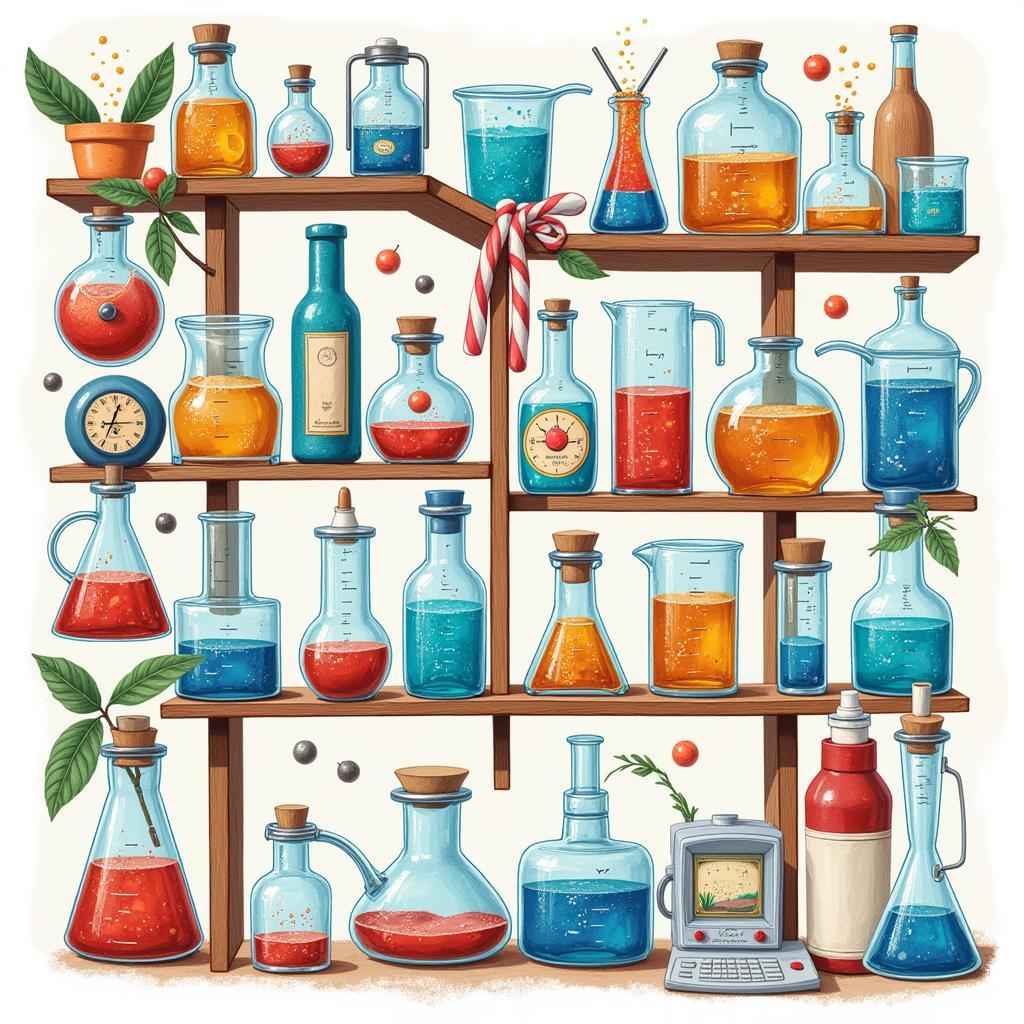Chemistry and society are inextricably intertwined. From the air we breathe to the food we eat, chemistry plays a fundamental role in our daily lives. But its impact extends far beyond everyday experiences, shaping our world in profound ways. A “Chemistry And Society Course” explores this complex relationship, fostering awareness, critical thinking, and ultimately, a more responsible and sustainable future.
 Chemistry in Everyday Life
Chemistry in Everyday Life
Unveiling the Hidden Chemistry Around Us
Many people perceive chemistry as a complex and intimidating subject confined to laboratories and textbooks. However, a “chemistry and society course” unveils the hidden chemistry woven into the fabric of our lives. It delves into the chemical processes behind seemingly mundane activities like brewing coffee, baking bread, or even the vibrant colors of autumn leaves. This newfound understanding fosters appreciation for the wonders of chemistry and its relevance to our world.
For instance, did you know that the delicious aroma of freshly brewed coffee is a result of complex chemical reactions involving volatile compounds? Or that the process of baking bread relies on the fascinating interaction between yeast, flour, and water, transforming simple ingredients into a culinary staple? Understanding these processes not only enhances our appreciation for the everyday but also empowers us to make informed choices as consumers and citizens.
Chemistry: A Double-Edged Sword
While chemistry has undoubtedly revolutionized our world, bringing advancements in medicine, agriculture, and technology, it also presents significant challenges. “Chemistry and society courses” critically examine the unintended consequences of chemical innovations, prompting discussions about ethical dilemmas and the responsibility that comes with scientific progress.
 Environmental Impact of Chemical Pollution
Environmental Impact of Chemical Pollution
One pressing issue is the environmental impact of chemical pollution. From plastic waste accumulating in our oceans to the alarming rate of climate change, the course encourages students to analyze the trade-offs between technological advancements and their ecological footprint.
Furthermore, the course explores the social and ethical implications of emerging technologies like nanotechnology and genetic engineering. As we push the boundaries of scientific knowledge, it becomes crucial to engage in thoughtful dialogue about the potential benefits and risks associated with these innovations, ensuring they are harnessed for the greater good of humanity and the planet.
The “Lunar Society of Birmingham,” discussed on our website, serves as a historical example of how intellectuals from various disciplines came together to discuss the societal implications of scientific advancements during the Industrial Revolution. Similarly, a “chemistry and society course” encourages interdisciplinary thinking, connecting chemistry to fields like economics, politics, and sociology, enabling students to understand the multifaceted nature of these challenges and explore sustainable solutions.
Empowering Informed Decision Making
A key objective of a “chemistry and society course” is to empower individuals to become informed decision-makers. By understanding the chemical principles underlying current issues, individuals can critically evaluate scientific claims, engage in informed debates, and advocate for evidence-based policies.
For example, understanding the science behind climate change equips individuals to discern factual information from misinformation, allowing them to make informed choices about their consumption patterns, support sustainable practices, and hold policymakers accountable for environmental regulations. Similarly, comprehending the chemistry of food additives or pharmaceuticals empowers individuals to make healthier choices for themselves and their families.
 Chemistry for a Sustainable Future
Chemistry for a Sustainable Future
Building a Better Future Through Chemistry
Ultimately, a “chemistry and society course” fosters a sense of responsibility and encourages students to become agents of change. By bridging the gap between scientific knowledge and societal awareness, these courses inspire individuals to apply their understanding of chemistry to address global challenges and create a more sustainable and equitable future for all.
Whether it’s pursuing a career in environmental science, advocating for responsible consumption, or simply making informed decisions in their daily lives, students leave these courses equipped with the knowledge, critical thinking skills, and ethical awareness necessary to make a positive impact on the world around them.
Frequently Asked Questions (FAQs)
-
What are the career options after taking a chemistry and society course?
This course opens doors to diverse career paths, including environmental science, science communication, policymaking, sustainable development, and education. -
Is this course only for science majors?
Absolutely not! This course is designed for students from all backgrounds, as it explores the intersection of chemistry with various disciplines and its impact on our daily lives. -
What topics are typically covered in a chemistry and society course?
Topics may include climate change, energy production, food security, water purification, pharmaceuticals, and the ethical implications of emerging technologies. -
How can I contribute to creating a more sustainable future through chemistry?
Start by making informed choices as a consumer, supporting sustainable practices, raising awareness within your community, and advocating for evidence-based policies. -
Are there any online resources available for further exploration?
Yes, you can find valuable information on related topics such as the “American Meteorological Society Journals” and the “Drugs Society and Human Behavior 18th Edition PDF” on our website.
For further assistance, please contact us at Phone Number: 02043854663, Email: [email protected], or visit us at our address: Khu 34, Bac Giang, 260000, Vietnam. Our dedicated customer support team is available 24/7 to assist you.